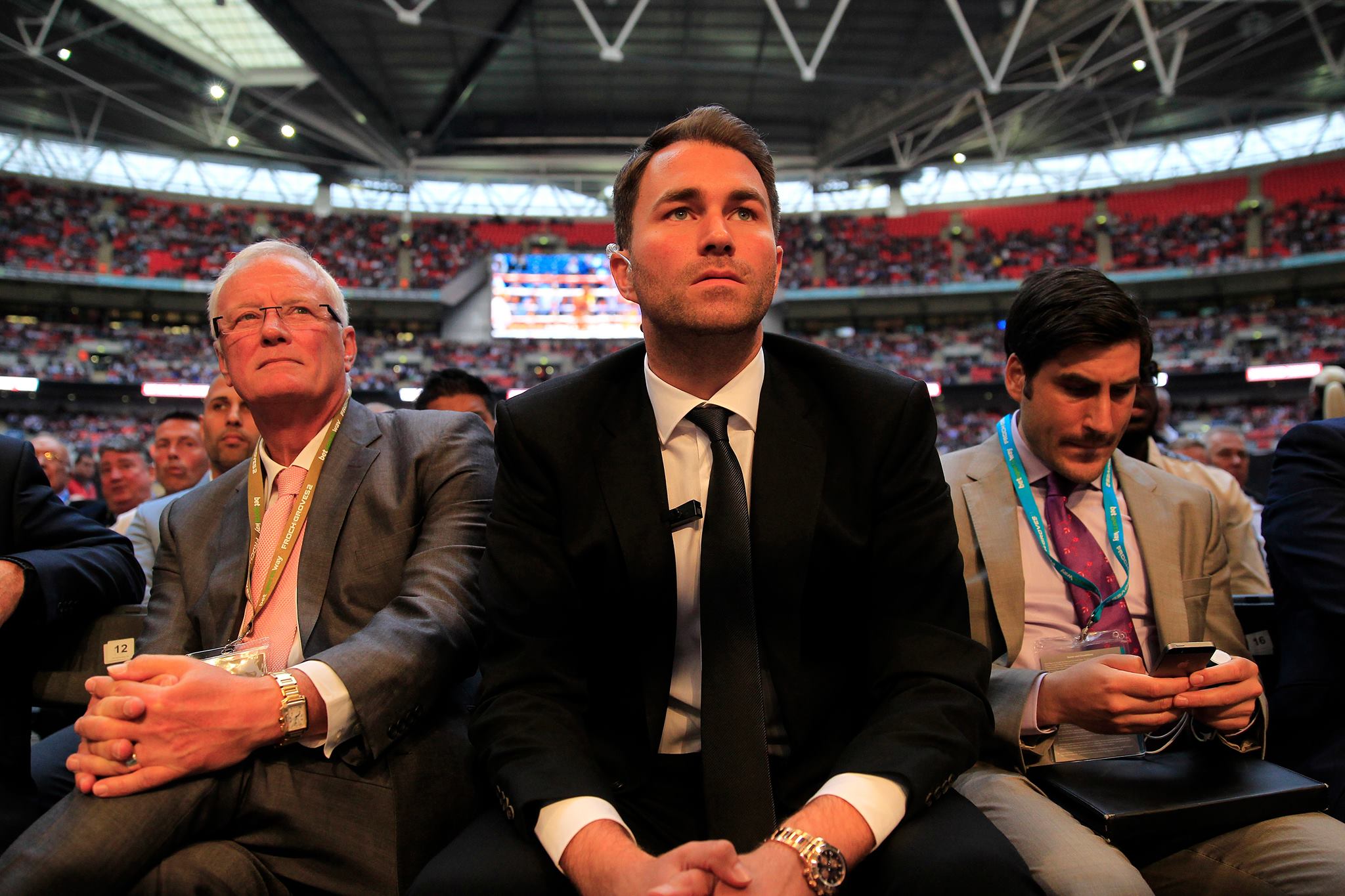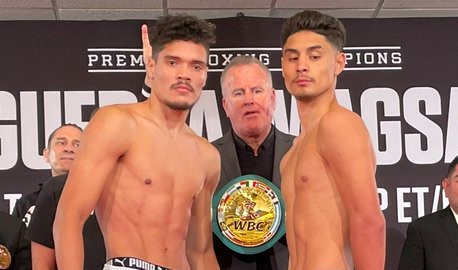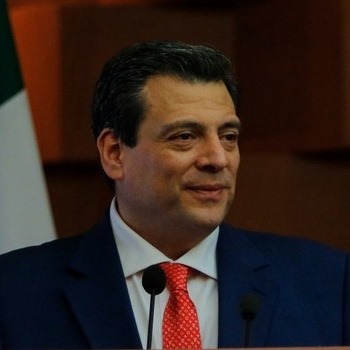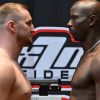By John “Gutterdandy” Walker
While fans can argue about who may emerge victorious this Saturday when WBC heavyweight champion Tyson Fury and challenger Dillian Whyte meet at Wembley Stadium in the UK, one thing the lead-up to this fight has made clear is that the mainstream boxing media itself is already a big loser before a single punch has been thrown. The media has too often shown itself to be asleep at the switch and remarkably incurious in the face of some very strange goings on.
The curious events surrounding this fight actually started back in October of 2021, when Whyte was supposed to face off against Sweden’s Otto Wallin, a rising heavyweight who gave Tyson Fury fits during their meeting in September of 2019. Early in that fight, Wallin ripped Fury’s face open with a punch, the gash so severe that it could have (and maybe should have) ended the fight, which would have seen The Gypsy King take his first loss.
Fury fought bravely, but by the final round, Wallin was dominating, literally knocking his opponent around the ring. The final scores submitted by the judges gave Fury a comfortable win that didn’t accurately reflect what had just taken place in the ring.
As the fight date with Wallin approached, the highly ranked Dillian Whyte was losing ground among bettors: Wallin’s strong performance against Fury, along with the fact that Whyte had suffered a devastating knockout at the hands of 40-year-old Russian veteran Alexander Povetkin in August of 2020 (he “avenged” that loss against a Covid-19 weakened Povetkin in the rematch in March 2021) were the main reasons given for this loss of confidence in “The Body Snatcher.”
The more the fight was discussed, the more it seemed to fans and analysts alike that the talented Swedish counter-puncher had an excellent shot at beating Whyte and setting up a rematch with the now WBC heavyweight champion Tyson Fury.
It was then that strange events began to occur.
It should be noted that Dillian Whyte was already no stranger to controversy. When he fought Montreal-based Columbian heavyweight Oscar Rivas in July of 2019 in the UK, Whyte emerged victorious with a unanimous decision (even though he had been knocked down in the ninth round), but it later emerged that steroids had been detected in Whyte’s blood before the fight, and that the Rivas camp was not made aware of this by either promoter Eddie Hearn or the British Boxing Board of Control.
Whyte was much later “cleared” by UK Anti Doping (UKAD), though they didn’t deny the fighter had steroids in his system, There were also complaints about Whyte’s very late switching of his gloves for fight, and a complaint was filed by infuriated Rivas trainer Russ Anber. One boxing publication said the Rivas-Whyte fight was buried beneath a “mountain of controversy.”
So perhaps it should have been no surprise when Dillian Whyte pulled out of his scheduled fight with Otto Wallin a mere ten days before the fight. The reason given was that Whyte suffered a “shoulder injury,” with no medical evidence offered up by the fighter or his promoter, Eddie Hearn. Wallin was understandably furious, but Hearn was dismissive, and the normally vociferous Whyte was mostly silent, a state of being that he would continue right into the lead-up to this Saturday’s title fight with Tyson Fury at Wembley Stadium in the UK.
Whyte inexplicably refused to take part in the promotion for this fight until he appeared at a Zoom press conference on April 14 (Whyte also no-showed the public workout during fight week). One might have thought the first question for Whyte from the carefully selected journalists in attendance would have been, “How is your shoulder holding up?” Shoulder injuries in boxing are often very serious, as both former WBO and WBC champion Vitali Klitschko and current contender Robert Helenius, who both suffered major career setbacks due to bad shoulders, can verify.
Dillian Whyte’s shoulder, if nothing else, was certainly set in the “cold” position during the lead-up to his upcoming bout with Fury, as he continually blew off media appearances and remained a ghostly figure.
If Dillian Whyte’s shoulder injury was bad enough to cause him to ditch the fight with Wallin with only ten days to go, it should have been logical to ask Whyte if he had experienced any problems with it in training camp. But not one of the selected journalists, many with years of experience and awards, even thought to mention it. Most seemed concerned with the usual “buddying up” to fighters with jovial greetings of “How’s it going champ?” and general inquiries that elicited superficial responses. It seemed as if no one really believed Whyte’s injury was legitimate in the first place, so why ask about it now?
After all, that might rock the boat.
This kind of obliviousness, intentional or otherwise, by the boxing media leading up to Fury vs Whyte has not just been limited to questions asked [or not asked] of Whyte. Tyson Fury’s involvement with reputed Irish drug cartel boss Daniel Kinahan, now a wanted man on the run from law enforcement with a $5 million dollar bounty on his head, was also given a pass in this initial virtual press conference. The reporters selected to ask Fury questions studiously avoided any mention of the Irish mob boss, a former close confidante of The Gypsy King.
When MTK Global boxing promotions, a Kinahan vehicle, finally collapsed and shut down entirely the following week, yet the boxing press still did its level best to ignore the situation. When Fury was finally asked a question about his former advisor Kinahan, he looked and sounded annoyed, and said that it was “none of his business,” but what he really seemed to be saying, judging by his tone, was, “it’s none of your business.”
This from a man who once wore the MTK logo on his clothing and who is making millions of dollars from his upcoming fight–which Fury now insists will be his last, in marked contrast to what he was saying before the Kinahan story hit the news.
A jittery and shaken Fury even claimed that the only time he’d broken the law was when he received a speeding ticket, yet spoke during the final press conference of the cocaine-fuelled binge that caused him to cancel two scheduled rematches with Ukrainian world heavyweight champion Wladimir Klitschko, who Fury dethroned in 2015 during a period of tumult in Klitschko’s personal life.
At press time, snorting cocaine is still against the law in the United Kingdom. But no one in the press caught this contradiction either. Follow-up questions are not the specialty of the current mainstream boxing press.
In The Guardian newspaper, Donald McRae wrote witheringly that the initial Zoom press conference for Fury vs Whyte “was engineered so that the only reporters invited to put any questions to Fury were those intent on swapping ingratiating greetings with him or asking him about his golf swing, his faith or how it will feel to fight on St George’s Day. Kinahan’s name was not mentioned once in over 50 minutes of banality, deception and stupidity. It was a shameful day for the charade of boxing journalism.”
In fact, this entire promotion has shown that the mainstream boxing media has often become nothing more than “access journalism,” a term often favored by scrappy American cultural commentator Jimmy Dore. When a journalist is too afraid to ask a question because what he or she really wants to do is to be buddies with fighters and/or promoters, and to protect his or her access to those same people, then that person is no longer a journalist, but a PR flack. And that is what too many boxing writers have become in 2022: practitioners of access journalism; public relations hacks masquerading as actual journalists.
Asking a question that might rock the boat, that might upset the camps of Tyson Fury or Dillian Whyte, is thus often deemed not worth the price that might have to be paid by the questioner.
The fate of Otto Wallin, who due to Dillian Whyte’s mysterious “shoulder injury” was left holding the bag for a long training camp and its attendant monetary and physical expenses, and denied a possible rematch with Tyson Fury, is of little concern to “access boxing journalists.” There are free tickets to fights, free food at press events, and back-slapping superficial interviews to protect. Oppositional journalism is just not in style, and in fact now marks one as a pariah in the small world of boxing writers.
So Otto Wallin will sit and watch to see what happens on Saturday, and wonder at what might have been.
And to see if Dillian Whyte’s tricky shoulder holds up.


















